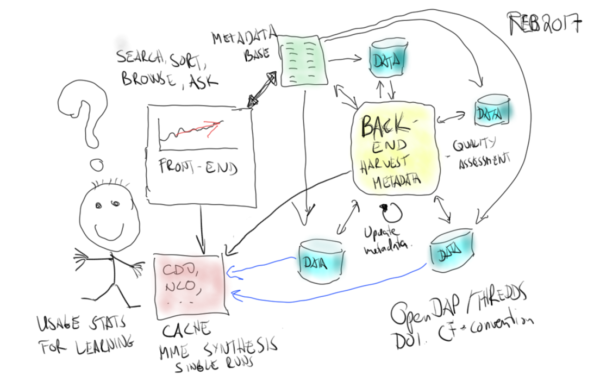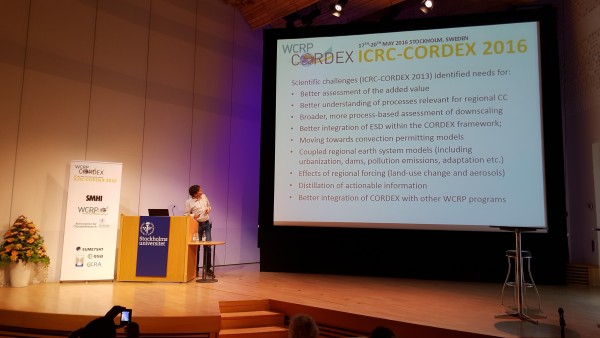What do you need to know about climate in order to be in the best position to adapt to future change? This question was discussed in a European workshop on Copernicus climate services during a heatwave in Barcelona, Spain (June 12-14).
Climate impacts
Nenana Ice Classic 2017
As I’ve done for a few years, here is the updated graph for the Nenana Ice Classic competition, which tracks the break up of ice on the Tanana River near Nenana in Alaska. It is now a 101-year time series tracking the winter/spring conditions in that part of Alaska, and shows clearly the long term trend towards earlier break up, and overall warming.
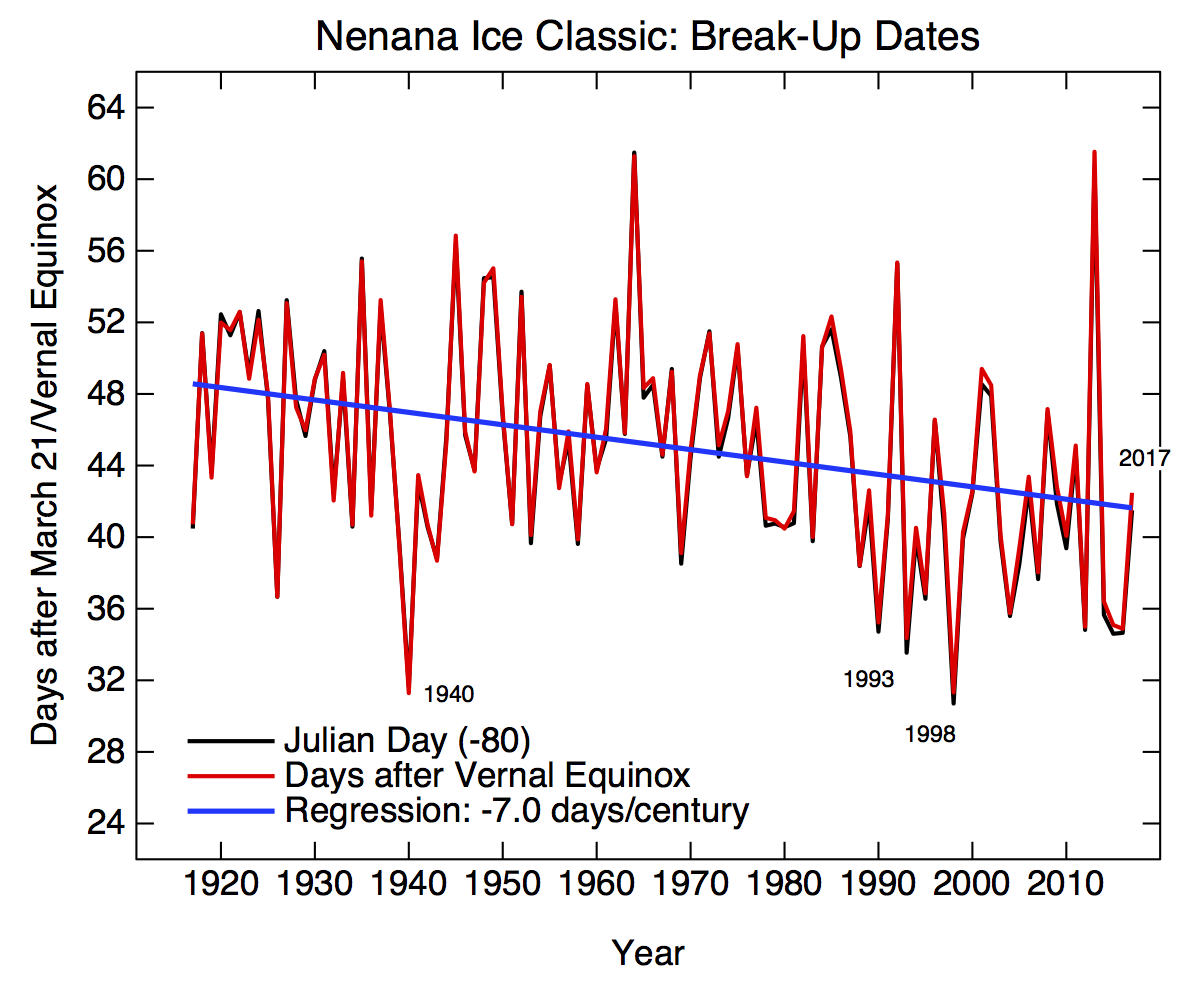
2017 was almost exactly on trend – roughly one week earlier than the average break up date a century ago. There was a short NPR piece on the significance again this week, but most of the commentary from last year and earlier is of course still valid.
My shadow bet on whether any climate contrarian site will mention this dataset remains in play (none have since 2013 which was an record late year).
Snow Water Ice and Water and Adaptive Actions for a Changing Arctic
The Arctic is changing fast, and the Arctic Council recently commissioned the Arctic Monitoring and Assessment Programme (AMAP) to write two new reports on the state of the Arctic cryosphere (snow, water, and ice) and how the people and the ecosystems in the Arctic can live with these changes.
The two reports have now just been published and are called Snow Water Ice and Permafrost in the Arctic Update (SWIPA-update) and Adaptive Actions for a Changing Arctic (AACA).
[Read more…] about Snow Water Ice and Water and Adaptive Actions for a Changing Arctic
New report: Climate change, impacts and vulnerability in Europe 2016
Another climate report is out – what’s new? Many of the previous reports have presented updated status on the climate and familiar topics such as temperature, precipitation, ice, snow, wind, and storm activities.
The latest report Climate change, impacts and vulnerability in Europe 2016 from the European Environment Agency (EEA) also includes an assessment of hail, a weather phenomenon that is often associated with lightening (a previous report from EASAC from 2013 also covers hail).
Usually, there has not been a lot of information about hail, but that is improving. Still, the jury is still out when it comes to hail and climate change:
Despite improvements in data availability, trends and projections of hail events are still uncertain.
[Read more…] about New report: Climate change, impacts and vulnerability in Europe 2016
Do regional climate models add value compared to global models?
Global climate models (GCM) are designed to simulate earth’s climate over the entire planet, but they have a limitation when it comes to describing local details due to heavy computational demands. There is a nice TED talk by Gavin that explains how climate models work.
We need to apply downscaling to compute the local details. Downscaling may be done through empirical-statistical downscaling (ESD) or regional climate models (RCMs) with a much finer grid. Both take the crude (low-resolution) solution provided by the GCMs and include finer topographical details (boundary conditions) to calculate more detailed information. However, does more details translate to a better representation of the world?
The question of “added value” was an important topic at the International Conference on Regional Climate conference hosted by CORDEX of the World Climate Research Programme (WCRP). The take-home message was mixed on whether RCMs provide a better description of local climatic conditions than the coarser GCMs.
[Read more…] about Do regional climate models add value compared to global models?
What drives uncertainties in adapting to sea-level rise?
Guest article by Sally Brown, University of Southampton
Let me get this off my chest – I sometimes get frustrated at climate scientists as they love to talk about uncertainties! To be sure, their work thrives on it. I’m someone who researches the projected impacts and adaptation to sea-level rise and gets passed ‘uncertain’ climate data projections to add to other ‘uncertain’ data projections in my impact modellers work bag. But climate scientists do a good job. Without exploring uncertainties, science loses robustness, but uncertainties in combination can become unbounded and unhelpful to end users.
Let’s take an adaptation to sea-level rise as an example: With increasing scientific knowledge, acceptance and mechanisms that would allow adaptation to potentially occur, one would think that adaptation would be straight forward to implement. Not so. Instead of hard and fast numbers, policy makers are faced with wide ranges of uncertainties from different sources, making decision making challenging. So what uncertainties are there in the drivers of change, and can understanding these uncertainties enable better decisions for adaptation?
Prior to considering adaptation in global or regional models, or implementation at local level, drivers of change and their impacts (and thus uncertainties) require analysis – here are a few examples. [Read more…] about What drives uncertainties in adapting to sea-level rise?
Millennia of sea-level change
How has global sea level changed in the past millennia? And how will it change in this century and in the coming millennia? What part do humans play? Several new papers provide new insights.
2500 years of past sea level variations
This week, a paper will appear in the Proceedings of the National Academy of Sciences (PNAS) with the first global statistical analysis of numerous individual studies of the history of sea level over the last 2500 years (Kopp et al. 2016 – I am one of the authors). Such data on past sea level changes before the start of tide gauge measurements can be obtained from drill cores in coastal sediments. By now there are enough local data curves from different parts of the world to create a global sea level curve.
Let’s right away look at the main result. The new global sea level history looks like this:
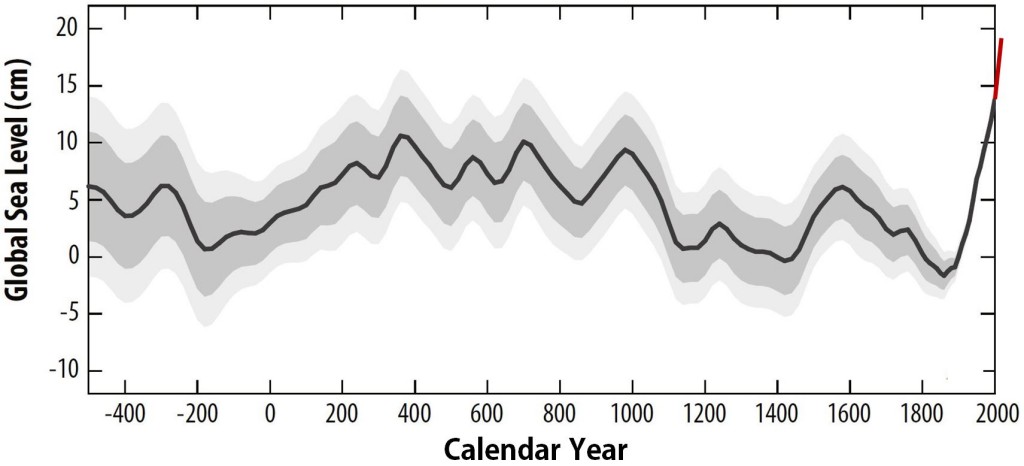
Fig. 1 Reconstruction of the global sea-level evolution based on proxy data from different parts of the world. The red line at the end (not included in the paper) illustrates the further global increase since 2000 by 5-6 cm from satellite data. [Read more…] about Millennia of sea-level change
References
- R.E. Kopp, A.C. Kemp, K. Bittermann, B.P. Horton, J.P. Donnelly, W.R. Gehrels, C.C. Hay, J.X. Mitrovica, E.D. Morrow, and S. Rahmstorf, "Temperature-driven global sea-level variability in the Common Era", Proceedings of the National Academy of Sciences, vol. 113, 2016. http://dx.doi.org/10.1073/pnas.1517056113
Anti-scientists
Ross McKitrick was so upset about a paper ‘Learning from mistakes in climate research’(Benestad et al., 2015) that he has written a letter of complaint and asked for immediate retraction of the pages discussing his work.
This is an unusual step in science, as most disagreements and debate involve a comment or a response to the original article. The exchange of views, then, provides perspectives from different angles and may enhance the understanding of the problem. This is part of a learning process.
Responding to McKitrick’s letter, however, is a new opportunity to explain some basic statistics, and it’s excellent to have some real and clear-cut examples for this purpose.
[Read more…] about Anti-scientists
References
- R.E. Benestad, D. Nuccitelli, S. Lewandowsky, K. Hayhoe, H.O. Hygen, R. van Dorland, and J. Cook, "Learning from mistakes in climate research", Theoretical and Applied Climatology, vol. 126, pp. 699-703, 2015. http://dx.doi.org/10.1007/s00704-015-1597-5
Climate change is coming to a place near you
What are the local consequences of a continued global warming? And what kind of future climate can you expect for you children? Do we expect more extreme events, and will a global warming affect the statistics of storms? Another question is how the local changes matters for local communities and the ecosystem.
It may be contrary to most people’s impression. We have a clearer picture of future climate changes on a global scale than of the local consequences associated with a global warming. And we know why.
[Read more…] about Climate change is coming to a place near you
A hypothesis about the cold winter in eastern North America + Update
The past winter was globally the warmest on record. At the same time it set a new cold record in the subpolar North Atlantic – and it was very cold in the eastern parts of North America. Are these things related?
Two weeks ago NOAA published the following map of temperature anomalies for the past December-January-February (i.e. the Northern Hemisphere winter). One week ago, we published a paper in Nature Climate Change (which had been in the works for a few years) arguing that the cold in the subpolar North Atlantic is indicative of an AMOC slowdown (as discussed in my last post). Immediately our readers started to ask (as we indeed had been asking ourselves): does the cold winter in eastern North America (culminating in the Inhofe snowball incident) have anything to do with what is going on in the Atlantic?
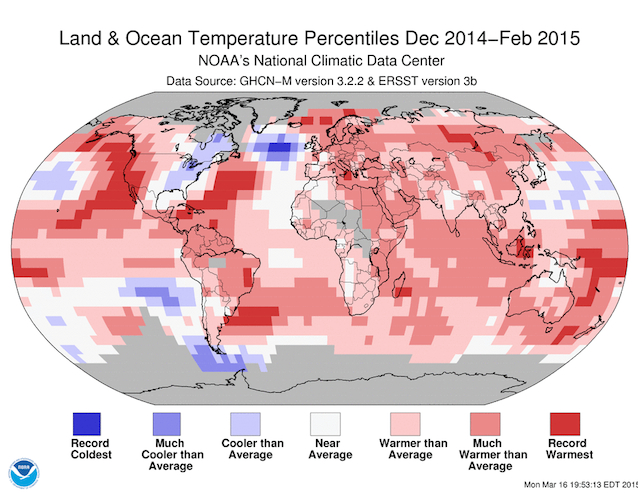 Fig. 1 Temperature anomaly map for the past december-january-february, from NOAA.
Fig. 1 Temperature anomaly map for the past december-january-february, from NOAA.
[Read more…] about A hypothesis about the cold winter in eastern North America + Update
References
- S. Rahmstorf, J.E. Box, G. Feulner, M.E. Mann, A. Robinson, S. Rutherford, and E.J. Schaffernicht, "Exceptional twentieth-century slowdown in Atlantic Ocean overturning circulation", Nature Climate Change, vol. 5, pp. 475-480, 2015. http://dx.doi.org/10.1038/nclimate2554
